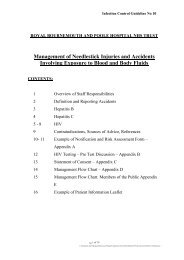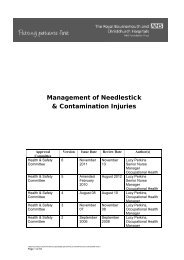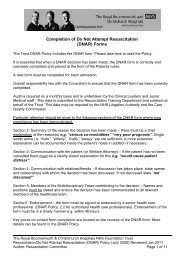Herpes Zoster Ophthalmicus (Shingles in the Eye) - Royal ...
Herpes Zoster Ophthalmicus (Shingles in the Eye) - Royal ...
Herpes Zoster Ophthalmicus (Shingles in the Eye) - Royal ...
Create successful ePaper yourself
Turn your PDF publications into a flip-book with our unique Google optimized e-Paper software.
<strong>Herpes</strong> <strong>Zoster</strong> <strong>Ophthalmicus</strong> (<strong>Sh<strong>in</strong>gles</strong> <strong>in</strong> <strong>the</strong> <strong>Eye</strong>)What is it and why have I got it?After an attack of chickenpox <strong>the</strong> virus (varicella zoster) rema<strong>in</strong>s<strong>in</strong> <strong>the</strong> body asleep (dormant). This virus is kept under controlby our immune system. However, <strong>in</strong> 20% of people <strong>the</strong> virus isreactivated result<strong>in</strong>g <strong>in</strong> a pa<strong>in</strong>ful rash with blisters (sh<strong>in</strong>gles) thatcan affect <strong>the</strong> body. The most likely cause is a weaken<strong>in</strong>g of <strong>the</strong>immune system with age, most patients are aged over 50 years.Stress, fatigue, o<strong>the</strong>r illnesses or medical treatment such aschemo<strong>the</strong>rapy can also cause a weaken<strong>in</strong>g of <strong>the</strong> immune systemand possibly sh<strong>in</strong>gles.When <strong>the</strong> sh<strong>in</strong>gles comes out around <strong>the</strong> eye it is called herpeszoster ophthalmicus (HZO) because it affects <strong>the</strong> ophthalmic nerve.HZO accounts for 10-25% of all cases of sh<strong>in</strong>gles.What are <strong>the</strong> symptoms?You may have one or more of <strong>the</strong>se symptoms:l A t<strong>in</strong>gl<strong>in</strong>g or prick<strong>in</strong>g sensation around <strong>the</strong> one eye, one sideof <strong>the</strong> forehead or head.l Pa<strong>in</strong> or numbness on one side of <strong>the</strong> head.l General feel<strong>in</strong>g of be<strong>in</strong>g unwell with a high temperature.How does HZO affect <strong>the</strong> eye?The virus can affect <strong>the</strong> eye <strong>in</strong> a number of ways, some m<strong>in</strong>or andsome more serious.l You may get a red eye which is noth<strong>in</strong>g more than a viralconjunctivitis. This usually settles with <strong>the</strong> antiviral tablets,an antibiotic drop or even just some lubricants.l You may get an <strong>in</strong>flammation on <strong>the</strong> cornea (clear surface of<strong>the</strong> eye). This also usually settles with <strong>the</strong> same treatment asviral conjunctivitis but sometimes an antiviral o<strong>in</strong>tment, acyclovir(Zovirax) is also given.l On occasions a corneal ulcer develops, this is also treated with<strong>the</strong> acyclovir o<strong>in</strong>tment.l If <strong>the</strong> deeper layers of <strong>the</strong> cornea are <strong>in</strong>volved <strong>the</strong>n a steroideye drop may be needed.l Some people develop an <strong>in</strong>flammation <strong>in</strong>side <strong>the</strong> eye (iritis oranterior uveitis). In this case steroid eye drops are used and<strong>the</strong>se need to be cont<strong>in</strong>ued for months as often <strong>the</strong><strong>in</strong>flammation comes back if stopped too soon.l Very rarely <strong>in</strong>flammation can develop at <strong>the</strong> back of <strong>the</strong> eye andthis is <strong>the</strong> most serious as vision can be reduced.<strong>Herpes</strong> <strong>Zoster</strong> <strong>Ophthalmicus</strong> (<strong>Sh<strong>in</strong>gles</strong> <strong>in</strong> <strong>the</strong> <strong>Eye</strong>)Dur<strong>in</strong>g <strong>the</strong> early stages you may not have developed a rash butthis often appears with<strong>in</strong> <strong>the</strong> first few days of <strong>the</strong> illness. You canalso get blisters <strong>in</strong> your hair, on your forehead, your eyelids andeven your nose. It is very important to see your doctor as soon aspossible and report all your symptoms. The treatment for HZO isantiviral tablets such as aciclovir, famciclovir or valacyclovir. Thesedrugs can shorten <strong>the</strong> attack of sh<strong>in</strong>gles and will usually relieve<strong>the</strong> pa<strong>in</strong>. However, for <strong>the</strong>se drugs to work, <strong>the</strong>y should be startedwith<strong>in</strong> two to three days of <strong>the</strong> rash appear<strong>in</strong>g.The doctor or nurse who exam<strong>in</strong>es you will expla<strong>in</strong> how <strong>the</strong> HZOhas affected your eye and will give you treatment and review you ifneeded. If you need to take steroid eye drops for a long time <strong>the</strong>nyou will be reviewed <strong>in</strong> <strong>the</strong> Outpatient cl<strong>in</strong>ic regularly.Will it come back?Viral conjunctivitis doesn’t usually come back after <strong>the</strong> first flare up.If you have <strong>in</strong>flammation <strong>in</strong>side <strong>the</strong> eye this can return, afterstopp<strong>in</strong>g <strong>the</strong> steroid eye drops, weeks, months or even years after<strong>the</strong> orig<strong>in</strong>al sh<strong>in</strong>gles flare up. If your eye becomes red and sore oryour vision is affected <strong>the</strong>n you should telephone <strong>the</strong> <strong>Eye</strong> Unit and<strong>the</strong> nurse will advise you or make you ano<strong>the</strong>r appo<strong>in</strong>tment to be seen.
















